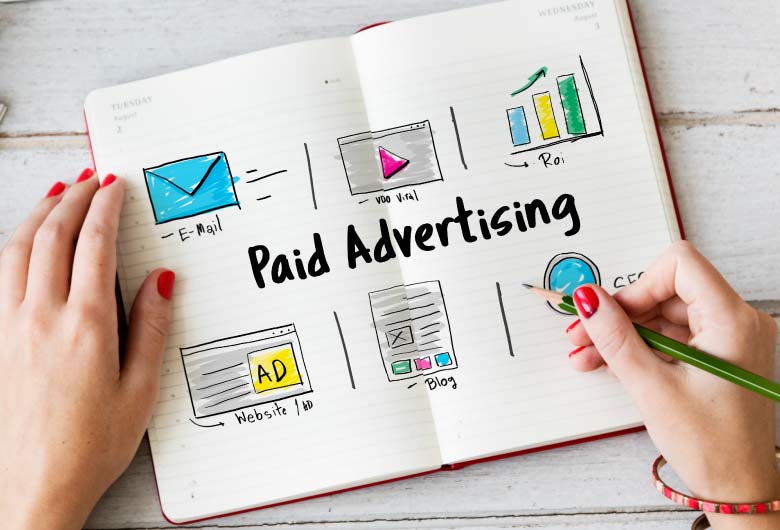21 Feb PPC Ayrshire – Boost Your Business with online Advertising Services

As businesses continue to compete in the digital landscape, having a strong online presence is more important than ever. With millions of websites and online businesses vying for customer attention, it can be challenging to stand out in the crowd. However, Pay-Per-Click (PPC) advertising can provide a targeted and cost-effective approach to reach your desired audience. In this article, we will explore how PPC Advertising can help businesses in Ayrshire and beyond, and how your organisation can benefit from this advertising strategy.
PPC in Ayrshire – Table Of Contents
• What is PPC Advertising in Ayrshire
• Do I need to hire a professional
• PPC encompasses a wide range of skills
• You need to optimise your website
• Think before you link
• Customise your landing pages
• Optimise your page speed & performance
• Meaningful steps for your PPC campaign
• Step 1: Define your goals and target audience
• Step 2: Conduct keyword research
• Step 3: Create compelling ad copy
• Step 4: Set up your PPC campaign
• Step 5: Monitor and optimise your campaign
• Conclusion
What is PPC Advertising in Ayrshire?
PPC Advertising is a type of online advertising where businesses pay each time a user clicks on their ads. These ads are typically displayed on search engines, such as Google, and social media platforms like Facebook and LinkedIn. When someone searches for a keyword related to your business, your ad will appear on the search results page, usually in a prime page position above business listings (the map pack) and above organic listings. PPC in Ayrshire allows you to target your ads to specific demographics, interests, and behaviors, making it a highly effective and efficient way to reach potential customers.
Do I need to hire a professional to manage my PPC or marketing campaign?
No, you don’t have to but we recommend you do! It is important to note that while it is possible to set up a campaign on your own, it will not be as effective as hiring a professional who has expertise and experience in PPC or SEO. Experienced professionals have a deeper understanding of the technical aspects of these campaigns, as well as the strategies, tactics and orchestration tools & software needed to achieve optimal results.
PPC encompasses a wide range of skills
To research, set up, manage and monitor an effective PPC or digital marketing campaign will encompass a wide range of skills. You should have an understanding of: online consumer habits, creative copywriting, SEO keyphrase research, competitor analysis, search engine algorithms (and new updates), web ranking factors, PPC biding strategies, re-targeting ads, A/B campaign testing, backlink or reciprocal link building, budget setting, page speed load times, device usability, internal linking structures, social lead gen ads, Google Search console, tag managers, Facebook pixel and Google Analytics, plus many more. A lot of skill sets & knowledge…right?
You need to optimise your website before a PPC Campaign
Before you start any PPC campaign, it is very important you first step back and address the landing pages that will work in conjunction with your paid adverts. This is extremely important, and this is why: when prospects click on a PPC ad, it is because the content of the ad has intrigued them, and they want to know more. But, if the link they click takes them to an unrelated or generic page on your website, such as your homepage, then that prospect will likely bounce (leave your website with no further interaction).
Think before you link
We see a lot of agencies steaming in with paid ads immediately, clicking users through to sub-performing web or landing pages. This is not optimising your budget and a good marketer will take a holistic approach, forming a foundational strategy, enhance all the sub-par elements and then assign budgets to advertising channels. You wouldn’t lay new roofing tiles on rotten wood timber trusses!
Customise your landing pages
A click on a PPC ad is a desire to find out more about what the ad was about, which is why it is highly recommended to create customised landing pages that coincide with the content of the ad. For instance, if you were running a PPC ad offering a month’s free membership at your gym, then the landing page for the ad should contain more details about the promotion, a coupon to redeem the free membership or something else that relates specifically to the ad content.
Optimise your page speed and performance
Another aspect that you must undertake with your landing pages is optimise pages for performance and load time because if prospects click your ad and end up on a page that does not load quickly, or is difficult to navigate, or has other technical problems; then they will also bounce. Always take the time to maximise your website conversions so that prospects who come later will be more likely to follow through. Here are a few ways you can optimise your site for conversions:
• Use clear and compelling calls to action (Buy Now, Sign Up)
• Use a simple design with lots of white space
• Create meaningful and attention-grabbing headlines
• Write copy that is clear and concise
• Use video and images thoughtfully to retain attention
• Make information easy to digest by using quotes and bullet lists
Meaningful steps for your PPC campaign
Step 1: Define your goals and target audience
Before you start creating your PPC campaign, it is essential to define your goals and target audience. Ask yourself what you want to achieve with your PPC campaign: is it driving traffic to your website, generating leads, or increasing sales or all of the above. Once you have defined your goals, you need to identify your target audience. Who are the people you want to reach with your ads? What are their demographics, interests, and behaviours? This information will help you create more targeted and effective ads.
Step 2: Conduct keyword research
Keyword research is the process of identifying the keywords and phrases that people use to search for products or services similar to yours. Conducting keyword research will help you create ads that are relevant to your target audience and increase the chances of your ads being clicked on. Use keyword research tools such as Google Keyword Planner, Ahrefs or SurferSEO to identify relevant keywords for your PPC campaign.
Step 3: Create compelling ad copy
Your ad copy is what will persuade people to click on your ads. Create compelling ad copy that speaks directly to your target audience and highlights the benefits of your product or service. Use clear and concise language, and make sure your ads are grammatically correct and free of typos. Include a call to action that encourages people to take action, such as “Sign up now” or “Learn more.”
Step 4: Set up your PPC campaign with goals & budget
Once you have defined your goals, identified your target audience, conducted keyword research, and created compelling ad copy, it is time to set up your PPC campaign. Choose the platform you want to run your ads on, such as Google Ads or Facebook Advertising, and follow the steps to create your campaign. Set your budget, bid on your chosen keywords (identify negative keywords too), and create your ads.
Step 5: Monitor and optimise your campaign
The key to a successful PPC campaign is to monitor and optimise it regularly. Monitor your campaign’s performance, including metrics such as click-through rates, conversion rates, and cost per click. Make adjustments to your campaign based on your performance data, such as adjusting your bids, testing new ad copy, targeting new keywords or run some A/B testing on two similar ads and asses the top performer.
Conclusion
Creating and executing a successful PPC campaign requires careful planning, research, and optimisation by a marketing expert. Follow the steps outlined in this article, and you will be well on your way to achieving your business goals through PPC advertising. Remember to monitor, adjust and optimise your campaign regularly to ensure it is delivering the results you require.





